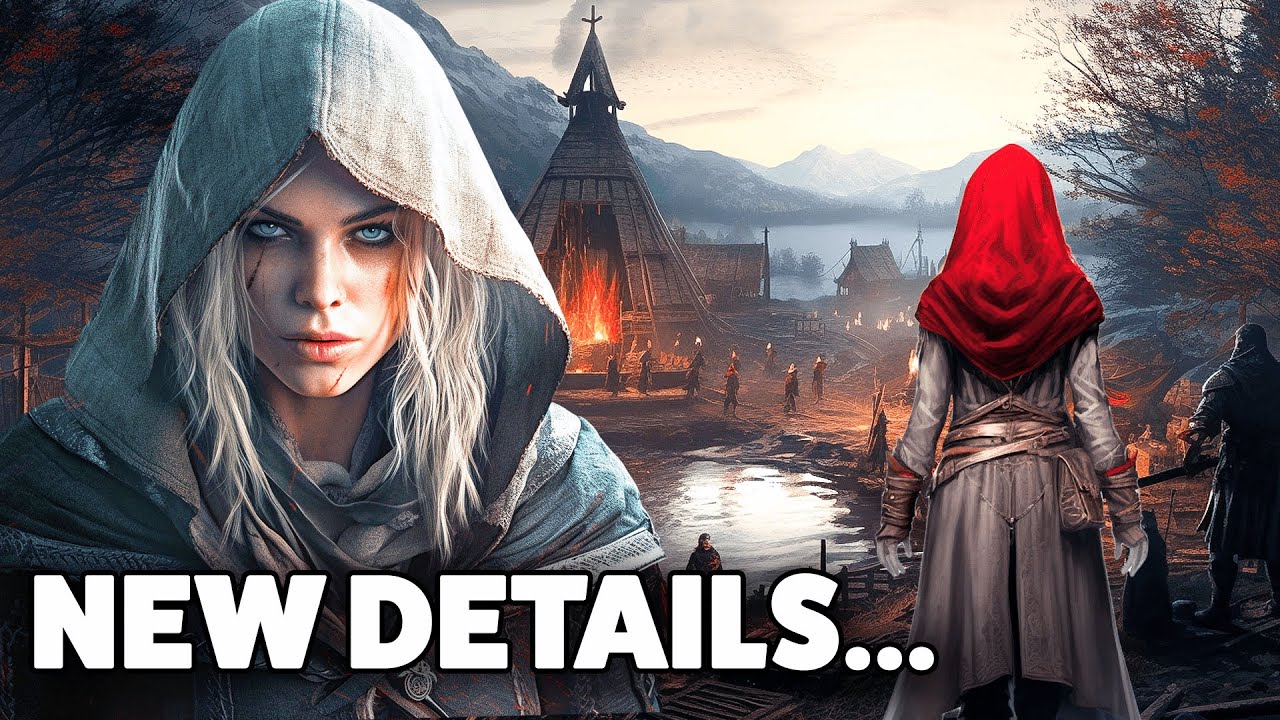The Assassin’s Creed franchise has captivated gamers for nearly two decades, but the first official details of Assassin’s Creed Hexe, slated for release in 2026, have sent anticipation to unprecedented heights. Set during the chilling witch hunt period of 16th-century Europe, Hexe promises to be a groundbreaking entry, blending a dark historical setting with supernatural elements and a female protagonist poised to become an icon. Developed by Ubisoft Montreal, this title is being hailed as potentially the best Assassin’s Creed game ever, thanks to its unique tone, innovative gameplay, and immersive world. Here’s a deep dive into the revealed details, why fans are calling it a game-changer, and what makes Hexe the most exciting chapter yet in the Assassin’s Creed saga.

A Haunting Setting: The Witch Hunt Era
Assassin’s Creed Hexe is set in the Holy Roman Empire during the peak of Europe’s witch hunts, roughly between 1500 and 1600, when tens of thousands of people—mostly women—were accused of witchcraft and executed in a wave of religious paranoia. This grim historical period, marked by fear, superstition, and brutal persecution, provides a perfect backdrop for Assassin’s Creed’s signature blend of history and intrigue. The game’s setting is likely centered in what is now Germany, where the witch trials were particularly intense, with cities like Bamberg and Würzburg witnessing mass executions.
The world of Hexe is described as dark and atmospheric, with fog-shrouded villages, dense forests, and gothic cathedrals creating a sense of dread. Unlike the sprawling open worlds of recent entries like Assassin’s Creed Shadows or Valhalla, Hexe will offer a more focused environment, with detailed urban hubs and rural outskirts that encourage stealth and exploration. The visual design, powered by Ubisoft’s Anvil Engine, aims to capture the eerie beauty of this era, from torchlit streets to snow-covered wilderness, making every moment feel like a descent into a historical horror story.
Elsa: A Revolutionary Protagonist
At the heart of Hexe is its protagonist, Elsa, a young woman with supernatural abilities that set her apart from any Assassin’s Creed hero before her. While Ubisoft has kept Elsa’s backstory vague to avoid spoilers, early details suggest she’s a target of the witch hunts, possibly framed as a sorceress due to her unique powers. One confirmed ability allows Elsa to perform a “witch walk,” where she possesses a cat to distract or manipulate enemies, adding a creative twist to the series’ stealth mechanics. Other rumored powers include casting spells to disorient foes or using charms to blend into crowds, blending magic with the traditional assassin toolkit of blades and parkour.
Elsa’s role as a female lead is significant, especially in a setting where women faced intense oppression. Her story is expected to explore themes of resistance, identity, and survival, offering a personal narrative that resonates with the broader historical context. Fans are already comparing Elsa to beloved protagonists like Ezio Auditore and Kassandra, with some predicting she could become the face of the franchise’s future. Her supernatural abilities, while a bold departure, are likely tied to the series’ sci-fi lore, possibly through Isu artifacts or Animus glitches, ensuring they fit within Assassin’s Creed’s established framework.
Gameplay: Stealth, Fear, and Innovation
Assassin’s Creed Hexe is being crafted as a return to the series’ stealth roots, drawing inspiration from classics like Assassin’s Creed II and the more recent Mirage (2023), while introducing innovative mechanics. Unlike the RPG-heavy Shadows or Odyssey, Hexe will feature a more linear structure, with tightly designed missions that emphasize stealth over open-world exploration. However, the game won’t abandon freedom entirely, offering “guided open-world elements” that allow players to approach objectives creatively, such as infiltrating a fortified convent or sabotaging a witch trial.
A standout feature is the “Fear System,” inspired by the Jack the Ripper DLC from Assassin’s Creed Syndicate. This mechanic lets players exploit the paranoia of the witch hunt era, using Elsa’s abilities to intimidate enemies or turn crowds against each other. For example, players might trigger hallucinations to make guards flee or plant evidence to spark accusations, creating chaos that aids their mission. The Fear System adds a psychological layer to stealth, making Hexe feel distinct from its predecessors.
Elsa’s supernatural abilities further enhance gameplay, offering new ways to navigate and fight. The “witch walk” cat possession is just one example, with other powers potentially allowing Elsa to manipulate shadows or create decoys. These abilities are balanced by the game’s focus on resource management, as Elsa’s magic may have limits to prevent overuse, encouraging strategic play. Traditional Assassin’s Creed elements, like hidden blade assassinations and rooftop parkour, remain central, ensuring Hexe feels like a true series entry despite its bold innovations.
Why Fans Are Calling It the Best Ever
The Hexe reveal has ignited a firestorm of excitement, with fans on platforms like X proclaiming it could be the pinnacle of Assassin’s Creed. Several factors are driving this hype:
A Unique Historical Setting: The witch hunt period is a fresh and underexplored backdrop for gaming, offering a mix of historical drama and gothic horror. Fans are thrilled at the prospect of exploring a world where superstition rules, with every mission steeped in tension and danger. The setting taps into a cultural fascination with witches, seen in media like A Discovery of Witches or Salem.
Supernatural Gameplay: Elsa’s magical abilities are a game-changer, adding variety to the stealth and combat that define Assassin’s Creed. The “witch walk” and Fear System have sparked endless speculation about how players can outsmart enemies, making Hexe feel like a bold evolution of the series’ formula.
A Compelling Heroine: Elsa’s status as a solo female protagonist has resonated with fans, especially after Shadows split focus between Yasuke and Naoe. Her powers and story promise a character who’s both relatable and larger-than-life, with the potential to leave a lasting mark on the franchise.
A Darker, More Focused Experience: The shift to a linear, stealth-driven game is a welcome change for fans who felt recent entries were too bloated. Hexe’s darker tone and horror elements set it apart, offering a moodier alternative to the epic scope of Valhalla or Shadows.
Ubisoft Montreal’s Track Record: Developed by the studio behind Origins and Valhalla, Hexe benefits from a team with a proven record of delivering high-quality Assassin’s Creed titles. The involvement of Clint Hocking, known for experimental games like Far Cry 2, adds confidence that Hexe will push creative boundaries.
Potential Challenges
Despite the excitement, Hexe faces hurdles. Ubisoft’s recent track record, including delays and controversies with Assassin’s Creed Shadows, has made some fans cautious. Shadows sparked debates over historical accuracy and suffered a major leak that spoiled its story, and Hexe’s early reveal could invite similar issues. The supernatural elements, while exciting, risk alienating purists who prefer the series’ grounded historical focus. Ubisoft will need to carefully integrate Elsa’s powers into the Animus framework to maintain narrative consistency.
The game’s ambitious scope also raises concerns about polish. With Ubisoft juggling multiple Assassin’s Creed projects—including Jade, Invictus, and a Black Flag remake—some fans worry Hexe could be rushed. The studio’s financial challenges and rumors of a Tencent buyout add further pressure, making Hexe a critical test of Ubisoft’s ability to deliver.
Ubisoft’s Vision for Assassin’s Creed
Hexe is a flagship title for Ubisoft’s Animus Hub, a platform launched with Shadows to unify Assassin’s Creed experiences. Set for release in 2026, it will likely coincide with other projects, such as the Black Flag remake, showcasing the franchise’s diversity. Ubisoft’s strategy is to offer varied experiences—RPGs, stealth games, multiplayer, and mobile—ensuring Assassin’s Creed appeals to a broad audience.
The game’s narrative could also advance the series’ modern-day storyline, which Shadows revitalized with new Animus anomalies. Elsa’s story might connect to the broader Assassin-Templar conflict, potentially introducing a present-day character or Isu artifact that ties Hexe to future titles like Nebula or Scarlet. Fans are eager to see how Ubisoft weaves these threads, especially after Shadows hinted at a dystopian future.
What’s Next for Hexe?
As Hexe is still in development, Ubisoft is expected to share more details in 2025, possibly through a gameplay trailer at Ubisoft Forward or a dedicated showcase. The game’s release window places it in mid-to-late 2026, giving Ubisoft time to refine its vision. Community feedback will be crucial, especially regarding the balance of supernatural and historical elements.
The Hexe reveal has already set a high bar, with fans speculating about everything from Elsa’s powers to the game’s soundtrack, rumored to feature haunting choral music inspired by the era. As anticipation builds, Hexe is poised to be a defining moment for Assassin’s Creed, proving the franchise can evolve while staying true to its core.
Conclusion
Assassin’s Creed Hexe is shaping up to be a spellbinding masterpiece, blending the terror of Europe’s witch hunts with the stealth and intrigue that define the series. With Elsa’s supernatural abilities, a gripping Fear System, and a hauntingly beautiful world, Hexe promises to redefine what an Assassin’s Creed game can be. Despite challenges like Ubisoft’s busy slate and the need to balance innovation with tradition, the early details have fans convinced this could be the best entry yet. As the hidden blade prepares to strike in 2026, Hexe is casting a powerful spell on gamers everywhere, and the world is watching to see if it delivers on its enchanted promise.





